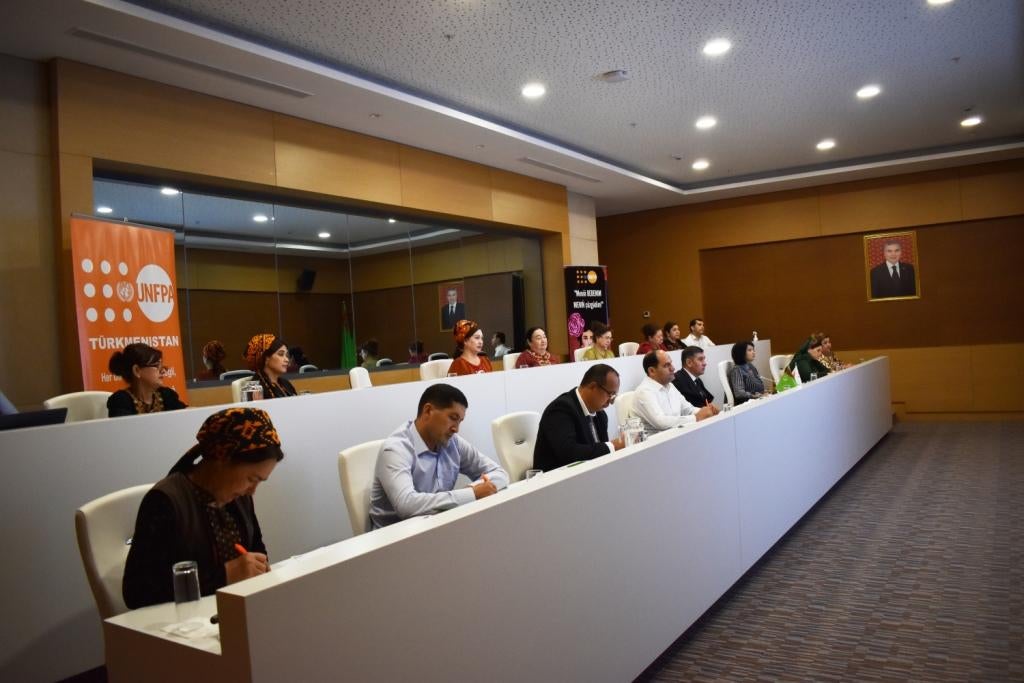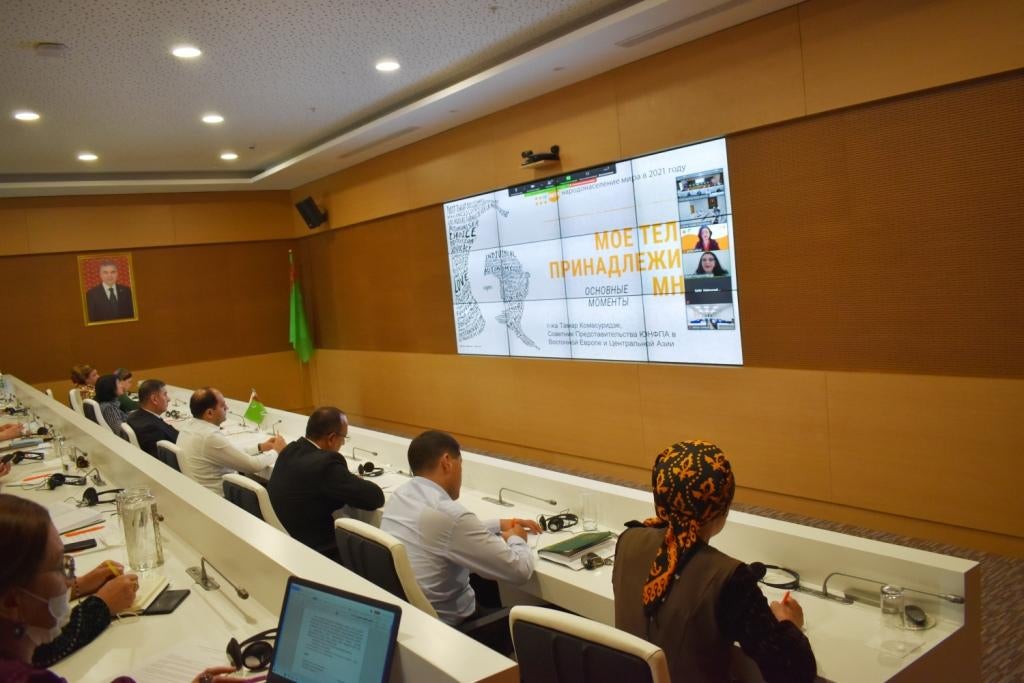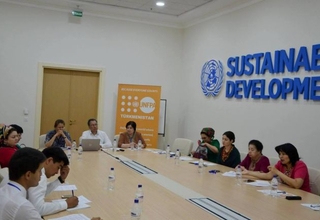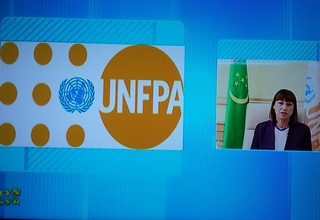The Government of Turkmenistan, with UNFPA support, conducted an Investment Case to determine the cost of ending the unmet need for family planning by 2030. The study launched on the eve of World Population Day revealed that an $7.5 million invested in family planning until 2030 would be needed to contribute to achieving universal access to reproductive health in Turkmenistan, which is a key component of the Sustainable Development Goals.
Following the commitments made in Nairobi, Turkmenistan initiated the study using a global methodology developed by UNFPA jointly with Johns Hopkins University, Victoria University, and the University of Washington and Avenir Health.
Making the case for expanding choices
“The Investment case presents three scenarios, and the results indicate financial and health gains in all of them,” said Mr. Mihai Horga, UNFPA International consultant who facilitated the study.
The most favorable scenario envisages expanding the coverage and the contraceptive choices for women and girls. This means that more women will be eligible to receive free contraception, and the reproductive health rooms will offer additional contraceptive choices. If this scenario is followed, the investments will avert more than 680,000 unintended pregnancies and 22,500 unsafe abortions, thus saving more than $87,5 million for the national public budget till the end of 2030 in purely economic terms, in addition to supporting the well-being of so many.

Family planning is not only a matter of human rights. It boosts economic development and is a precondition for achieving Sustainable Development Goals. When countries prioritize and invest in family planning, they promote healthier populations, more efficient health systems, and stronger economies.
Starting in 2017, Turkmenistan has taken over financial ownership to provide free-of-charge contraceptives for vulnerable women, previously supported by UNFPA. This commitment contributes to maintaining progress on maternal health and ending preventable maternal deaths, which is currently one of the lowest in Eastern Europe and Central Asia. As the global pandemic threatens to reverse these positive achievements, it is crucial to continue investing in these areas.
Should the ongoing investments continue, the unmet need in family planning could continue to decrease in the country. However, there are still about 160,000 women aged 15-49 who would like to prevent or delay their pregnancy but are not using modern contraceptives. The reasons are different for each woman ranging from lack of information on services to lack of support from their parents, husband or communities, to ability to decide or purchase contraceptives by themselves.
Amid the global pandemic, UNFPA supports the Ministry of Health and Medical Industry of Turkmenistan in ensuring that the 95 reproductive health rooms countrywide do not experience a stock-out of the contraceptives. Despite the global supply chain disruptions, currently, all reproductive health rooms are equipped with at least four modern methods of contraceptives.
“UNFPA congratulates the Government of Turkmenistan for staying true to its Nairobi Commitments and conducting the Investment Case on Ending unmet need for family planning in Turkmenistan by 2030,” said Ms. Giulia Vallese, UNFPA Country Director for Turkmenistan. “Evidence shows that every dollar invested in family planning will yield more than $7 in financial returns for the public health system over the next nine years, in addition to empowering women to lead healthier and more productive lives.”
“UNFPA will continue partnering with the Government to accelerate progress towards achieving universal access to reproductive health, where the family planning needs of all women and couples will be covered, including those furthest behind,” said Ms. Vallese. “Within the framework of the Government/UNFPA Country Programme for 2021-2025 and the newly adopted National Strategy “Healthy mother – Healthy child – Healthy future”, UNFPA will support the improvement of a health financing system to ensure increased and sustainable financing and rights and choices for all women and girls in Turkmenistan.”
Decision-making power and bodily autonomy
Family planning is also central to women’s empowerment. Together with the Launch of the Investment case, UNFPA presented key findings of the State of World Population 2021 report, which focuses on bodily autonomy.
Dr. Tamar Khomasuridze, UNFPA Eastern Europe and Central Asia Regional Advisor on Reproductive Health, reiterated that one of the reasons why women continue lacking access to quality reproductive health services is due to their limited ability to make choices about their own body without fear of violence or having someone else decide for them.

“According to the report, nearly half of all women worldwide are denied their bodily autonomy, measured through the power to make a decision about a women’s own body (SDG indicator 5.6.1) and analyzing the laws in different countries that support or constrain decision-making power of women (SDG indicator 5.6.2),” said UNFPA Regional Advisor.
In the countries of Eastern Europe and Central Asia, the share of women not fully empowered to make choices over healthcare, contraception, and the ability to say yes or no to sex is still significant: 19 percent in Ukraine, 23 percent in Kyrgyzstan, 31 percent in Albania and 34 percent in Armenia. In Turkmenistan, nearly 60 percent of women cannot make autonomous decisions on these fundamental issues.
Beyond the three dimensions captured in SDG indicator 5.6.1, there are other aspects of bodily autonomy that are firmly addressed through international law and that violate fundamental human rights. They include child marriage, “honor” killings, marital rape, reproductive coercion, denial in reproductive health education and “virginity” testing, among many others.
“Our communities and countries will only be able to flourish when every individual will have the power to make decisions about their bodies and to chart their own future,” said Dr. Khomasuridze.
“When women and girls can make the most fundamental choices about their bodies, they not only gain in terms of autonomy but also through advances in health and education, income, economic and employment opportunities and safety. These add up to a world of greater justice and human well-being, which benefits us all.”
Download the Investment Case on Ending unmet need for family planning in Turkmenistan by 2030
Read the Global joint study “Costing the Three Transformative Results”
Read the UNFPA Global State of World Population 2021 Report
For more information, please contact:
Kemal Goshliyev,
National Programme Officer on Reproductive Health
Ene Tuyliyeva,
Youth and Communications
www.instagram.com/unfpa_turkmenistan
imo: +99362 833158



